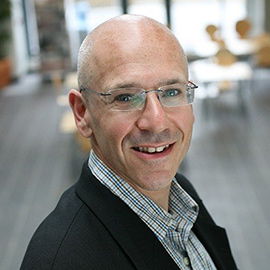Professor Neil Greenberg is a consultant occupational and forensic psychiatrist at Kings College London. Neil is currently working on MeT4VeT which is a digital technology project for mental: https://www.kcl.ac.uk/kcmhr/admmh/greenberg-profile.

What are you currently working on?
At the present the team are working on a number of project looking at moral injury in veterans. Moral injury is the psychological distress which follows being exposed to situations which breach someone’s moral or ethical code. Whilst they are not mental health problems, our previous research has shown that they predispose people to suffering with PTSD (post traumatic stress disorder), depression and indeed suicidality. To date, there are no manualised treatment for moral injury related mental health disorders and we were delighted to be awarded a grant from the Forces in Mind Trust to help develop a standardised treatment approach to moral injury related mental health problems for veterans. We are also working on looking at what the impact of COVID-19 has been on NHS staff who also may have experienced moral injuries as a result of working during the pandemic.
What got your into your field of study in the first place?
I joined the Royal Navy when I was 21 and served for 23 years being lucky enough to travel the world in ships, submarines and with the Royal Marines Commandos as a general doctor and then psychiatrist. This got me interested in military life and the mental health impact that challenging incidents have on employees and what organisations can do to effectively support their staff. I was lucky enough to be the Defence Professor of Mental Health for a number of years before I retired from the Royal Navy in 2013 and my current research interested are an evolution of those I developed whilst in service.
What was your path to where you are now?
I would like to translate the great work that has been done with the military, veterans, and their families in order to help staff working in other trauma-exposed organisations such as the media, the emergency services, the NHS and various branches of the Government such as the Foreign and Commonwealth Office. I think there such good lessons that can be translated [not simply exported] to non-military organisations that will be able to help many staff carrying out vitally important roles for the nation that it would be wasteful not to explore this further. I have been privileged to be able to work closely with the NHS during the pandemic to help better support the mental health of NHS staff.
How are you finding working from home?
During the early part of the pandemic I was asked to set up and run the mental health strategy for staff at the London Nightingale Hospital, so I was not at home all the time. However, over the last few months home working has been rather good most of the time although I am indebted to my fabulous wife for doing the lion’s share of child care [I have done some!]. I am looking forward to travelling to work and other meetings soon though; I have nearly had my fill of webinars and remote meetings.
What advice would you like to give PhD students and early career researchers that you wish someone had said to you?
To jump into a boat [research field] that is of interest to you without being too focused on getting exactly the role you want. I think if you let a boat travel in a positive direction for a while, you’ll often see sights [and other boats] which will stimulate your interest. Singlemindedness is useful when it comes to getting tasks done, it’s not helpful when you are trying to plan what your future should be. Just like walking up a hill, you sometimes can’t see the next summit until you get to the top of the foothill you are walking on. Also make sure you find good mentors and role models even if they are not your direct line manager/supervisors – in my experience approached properly most academics are content to share their stories with early career researchers. Don’t be afraid to ask for opportunities; don’t just wait to be asked.
What are your top tips for getting published?
Offer to help out on projects of all sorts. If someone is talking about needing bits of papers written, or getting an old manuscript into a form ready for submission to a journal, put your hand up and offer to help. Once again, proactivity can make a big difference. I have found that enthusiastic and willing junior staff (students or early career researchers) have been able to turn bits of data or old papers into papers that have been published. Many seniors academics are have lots of nearly written documents or not quite analysed datasets sitting around, ask them if they do and if you can help get it into print.
